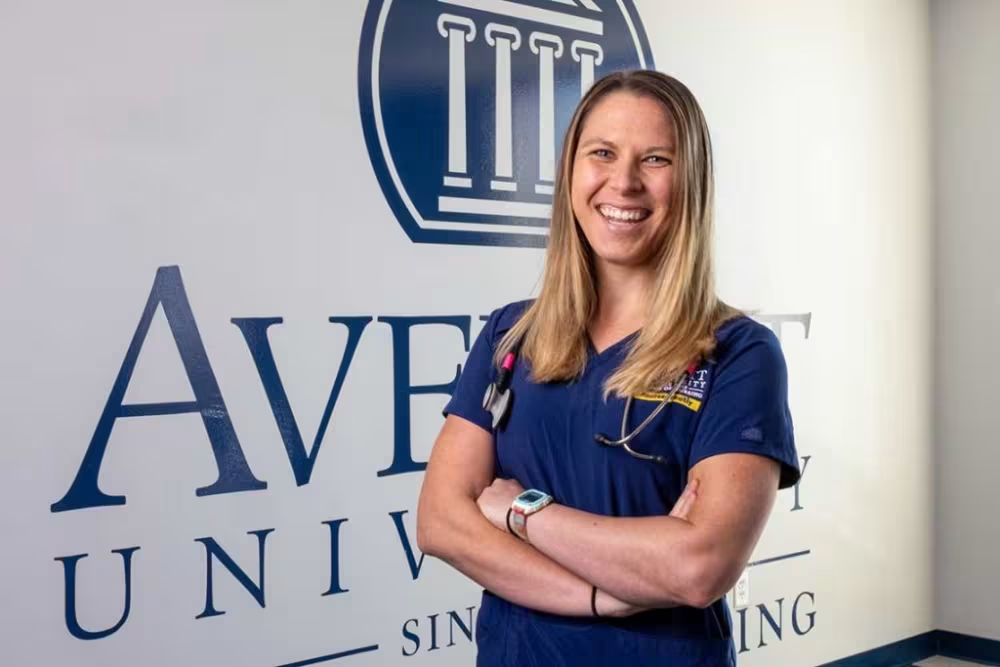Nursing School vs. Medical School: Choosing the Right Path
Each blog post is dated and contains accurate information as of that date. Certain information may have changed since the blog post publication date. If you would like to confirm the current accuracy of blog information, please visit our ABSN overview page or contact admissions at (866) 483-8705.
There are many differences to consider when choosing between nursing school vs. medical school. Nursing school focuses on holistic patient care, whereas medical school focuses on the disease process. Nursing school might be right for you if you’d like to enter the healthcare workforce sooner and work closely with patients.

Both nurses and doctors play an important role in healthcare and are well-trained clinicians who can practice with autonomy. There are differences to be aware of as you choose between going to nursing school vs. medical school.
If you decide that nursing school is the right choice for you, you can start your career faster by enrolling in Averett University’s Accelerated BSN (ABSN) program. With a completed non-nursing bachelor’s degree or at least 60 non-nursing college credits, you could earn your Bachelor of Science in Nursing (BSN) in as few as 16 months, following the completion of the prerequisites.
To help decide between the two paths, take a closer look at the main differences between medical school vs. nursing school, such as the curricula. Examine the pros and cons of attending either type of school and consider how a doctor’s and nurse’s typical responsibilities differ. Then, decide which path is best aligned with your strengths and career aspirations.
What’s the Difference Between Nursing School and Medical School?
Although all healthcare careers focus on maintaining and improving health, the role of a nurse vs. doctor is different, which is reflected in the respective education programs.
For example, medical school focuses on medical science, such as how diseases affect the body on a cellular level. Although nursing school also delves into medical science, the primary focus is on holistic patient care, such as how often pain medications may be administered to a post-surgical patient or how to insert intravenous (IV) lines.

The main differences between nursing school vs. medical school are:
- Curriculum: Nursing schools follow a holistic patient care framework, which emphasizes the needs of the individual patient. Medical schools focus on the disease model, which emphasizes the disease process, diagnosis, and treatment.
- Admissions requirements: Medical schools require completion of an undergraduate degree that emphasizes life sciences, such as a biology degree with a pre-med emphasis. Applicants must also take the MCAT admission test. Nursing schools may accept students straight out of high school for a four-year BSN program or, for an ABSN program, require either a completed degree in a non-nursing area or a minimum number of credits.
- Learning model: Both medical school and nursing school include didactic and hands-on experiential learning. Nursing schools, particularly ABSN programs, may also offer online coursework for greater convenience.
- Length: Medical school is four years, followed by residency training and sometimes fellowship training. Nursing school may range from 12 to 16 months for an ABSN program or four years for a traditional BSN program.

Consider these top 7 reasons why nursing school is worth it.
Do Nurses Have to Go to Medical School?
Nurses do not have to go to medical school to become registered nurses (RNs). Instead, completing a nursing program, such as one that confers a BSN, is necessary to become a nurse. A licensed, working nurse might later decide to attend medical school if they decide they’d rather become a doctor.
Nursing School vs. Medical School: Pros and Cons
Before you choose between becoming a nurse vs. doctor, take a deeper dive into the pros and cons of each career path.
Pros of Being a Nurse
- Enter the workforce much sooner
- Get to spend more time with patients
- Be part of a well-respected profession
- Have strong earning potential
- Have plenty of opportunities for career advancement and specialization
Cons of Being a Nurse
- Might need to deal with difficult patients
- Some nursing specialties require longer shifts
- Can involve physical strain and emotional stress

Pros of Being a Doctor
- Have greater decision-making autonomy
- Can diagnose and develop patient treatment plans
- Have strong earning potential, higher than nurses
- Have opportunities for career specialization
Cons of Being a Doctor
- Years of required education delay entering the workforce
- Carries considerable student debt from medical school
- Some medical specialties require you to be on call
- Higher risk of being sued for medical malpractice
- Unable to spend as much time with each patient as nurses can
In short, if you want to work closely and develop strong relationships with your patients and enter the healthcare workforce as soon as possible, becoming a nurse could be the right choice for you.
Roles and Responsibilities: Nurse vs. Doctor
A clinician’s day can vary widely according to their practice specialty. For example, some nurses, such as school nurses, spend more time on health screenings and health promotion than on clinical care. Likewise, a trauma surgeon will spend far more time in the operating room than an ear, nose, and throat specialist.
Despite the differences in responsibilities across clinical areas, clinicians can expect to handle some common tasks.

What Do Nurses Do?
Some typical RN responsibilities include:
- Performing head-to-toe patient assessments
- Recording symptoms and medical histories
- Administering medications and other treatments
- Developing nursing care plans
- Operating medical equipment
- Delivering patient education
- Providing wound care
- Advocating for patients
Try these 10 effective strategies for studying for the NCLEX.

What Do Doctors Do?
Some typical physician responsibilities include:
- Reviewing patients’ medical histories and performing physical exams
- Ordering tests, reviewing results, and diagnosing health problems
- Documenting patient information
- Developing treatment plans
- Performing procedures and other treatments
- Providing patient education
- Dealing with insurance company requirements, such as requesting prior authorization and proving the medical necessity of treatments
Career Opportunities in Nursing and Medicine
If you’re still deciding between medical school vs. nursing school, it can be helpful to explore the career possibilities.

Explore alternative nursing careers outside the hospital.
Nursing Career Options
There is a significant, sustained demand for qualified nurses in the U.S. According to the U.S. Bureau of Labor Statistics (BLS), the job growth rate for all types of RNs is expected to be 6% from 2023 through 2033, higher than average. This indicates that healthcare employers expect to hire about 197,200 new nurses during this period.
Nurses can choose from many different nursing specialties and work settings. You might decide to work with children as a pediatric nurse or with cancer patients as an oncology nurse. You might find work as a school nurse, community health nurse, or even a disaster relief nurse.
Nurses can work in dermatology clinics, law firms, pharmaceutical companies, and beyond.
After gaining some clinical experience as an RN, you might decide to go back to school for a graduate degree in nursing. Then, you could pursue the necessary board certification and licensure to become an advanced practice registered nurse (APRN). The four main types of APRNs are:
- Clinical nurse specialist (CNS)
- Certified nurse midwife (CNM)
- Certified registered nurse anesthetist (CRNA)
- Nurse practitioner (NP)
An APRN practices with greater autonomy and a broader scope of responsibility, often effecting change at an organizational level. NPs may also practice like physicians. Depending on the state they work in, their scope of practice may include diagnosis and disease treatment, health promotion, and prescribing authority.

Careers for Physicians
The job growth rate for physicians and surgeons isn’t as high as it is for nurses. The BLS expects a 4% growth rate from 2023 through 2033, indicating a need for about 34,500 new doctors during this period.
Physicians can work in clinical settings, like hospitals and family care offices, as well as in nonclinical settings, such as nonprofit organizations and government agencies. Physicians and surgeons typically specialize in a particular area of medicine, such as:
- Cardiology
- Anesthesiology
- Family medicine
- Emergency medicine
Others work on medical research, consulting, or public policy.
Get Ready for Your Nursing Career at Averett
Averett University has been educating students in Virginia since 1859. Our ABSN program maintains an innovative learning environment committed to fostering academic, personal, and professional growth. Our small class sizes, dedicated instructors, and Academic Success Coaches support each student’s progress toward a nursing career.
When you’re ready to make the switch to nursing, Averett is here to help. Contact an admissions advisor today to discuss the next steps.
